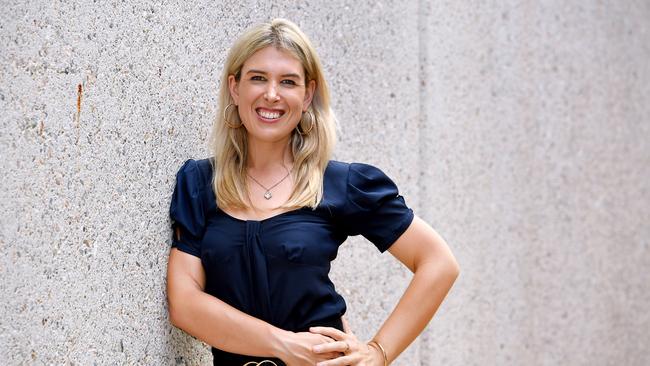Inside dangerous eating trends taking over our schools
A dangerous social media trend has infiltrated Queensland schools encouraging restrictive eating pacts between students, as six children are admitted to hospitals every day.
Education
Don't miss out on the headlines from Education. Followed categories will be added to My News.
A dangerous social media trend has infiltrated Queensland schools encouraging restrictive eating pacts between students, as six children are admitted to hospitals every day suffering from health complications related to an eating disorder.
Shocking data from Queensland Health revealed people aged between 0-19 were admitted to public and private facilities 1,304 times between January and July this year, with the age group on target to surpass last year’s total of 2,212 admissions.
Diet clubs are a newly emerging trend in schools where children encourage their fellow classmates to engage in dangerous eating habits to achieve specific lifestyle or body shape, has raised serious alarm bell among teachers, who are now desperately seeking help to deal with the pack behaviour.
More than 1000 Queenslanders have also presented to an emergency departments with signs of an eating disorder so far in 2023, half of which were aged between 10 and 19.
Alarmingly, sixteen of those presentations were below the age of 10.
The concerning growth of the diet club trend has prompted one Queensland school teacher to plea for a major health curriculum overhaul, revealing she believed extreme dieting behaviours among students had “never been worse”.
“We’ve never seen anything like it,” she said.
“I know of kids who were being admitted for eating disorders at six years of age, requiring tube feeding at hospital because they didn’t want to get fat.
“We have girls pass out because they refuse to take their jumpers off because they don’t like how their body looks in it and would rather feel unwell to the point of passing out at school.
“Teachers know this is happening but they have no training in eating disorders, we know abuse, self harm, signs of neglect but not how to help kids develop a positive body image. It’s not seen as a priority.”


The teacher said the current school curriculum heavily relied on personal interpretations and needed to be changed to help children develop positive food relationships.
She said school diet culture was “really pervasive” with students told through certain subjects to track their BMI, keep food diaries and complete assignments on how to improve their diets and kids as young as four taught to separate “good” and “bad” foods.
“There are prep worksheets where kids are colouring good foods green and bad foods red,” the teacher said.
“They’re being told ‘chocolate is bad it will make you fat’, it’s brainwashing.
“There’s also lunch box policy in primary school’s that don’t allow junk food and kids who bring it are told they’re naughty.
“Then we wonder how these kids get eating disorders.”
Education Minister Grace Grace acknowledged the “real issue” of negative food relationships and said the curriculum had recently been updated to “clearly identify” body image and self esteem issues.
“Through the Australian Curriculum, Queensland state schools have a key focus on this issue, with wellbeing programs featuring lessons on healthy eating, food and nutrition and physical activity,” she said.
A Butterfly Foundation survey launched this year involving 1600 kids aged 12 to 18 found high levels of body dissatisfaction, with 93 per cent of the 300 Queenslander respondents saying they held some level of body image concern.
The alarming results prompted the foundation to launch a Body Kind Schools program that helps schools provide body positive environments.
Nearly 170 Queensland schools have signed up to participate in the program.
The foundation says teachers have also been contacting the organisation in droves to seek advice on how to deal with signs of eating disorders and dangerous diet clubs popping up across several schools across the state.
Butterfly Foundation education services manager Helen Bird said teachers were also seeking advice on how to approach students displaying disordered eating, food shaming or restrictive eating at school.
“The inquiries for our services from primary schools is also feeling a lot more intense than it ever has before,” she said.
Ms Bird said dangerous diet fads promoted through TikTok and Instagram were incorrectly viewed by students as expert advice, with diet clubs founded on support, competitiveness and comparative behaviours.
“There’s a growing culture of not eating in the school day because it’s not cool,” she said.
“They don't want to eat in front of others, they’re concerned about people commenting on their food choices, what they’re eating, how much they’re eating, smells, cultural background, anything.”

Clinical nutritionist Lexi Crouch, who battled her own eating disorder from the age of seven, said the “what I eat in a day” and “girl dinner” social media trends were particularly damaging.
She said diet culture needed to be addressed at schools, and children taught how to develop a healthy and balanced relationship with food, as they were currently looking to influencers as authority figures and taking their word as “gospel”.
“Disordered eating can start at such a young age and as a parent it is something I am conscious about from my own first hand experience at a young age,” Ms Crouch said.
“There is a growing need for teachers to be properly educated and to include positive body image in the curriculum.

“This is something I wish I personally experienced at a young age instead of being drawn into diet culture myself before making a full recovery from an eating disorder.”
Minister Grace noted the governments' recent multimillion-dollar investments in eating disorder and mental wellbeing school programs but said parents also had a “role to play”.
“While schools will absolutely do their bit, this is a broader societal challenge and parents and carers also have a central role to play,” she said.




